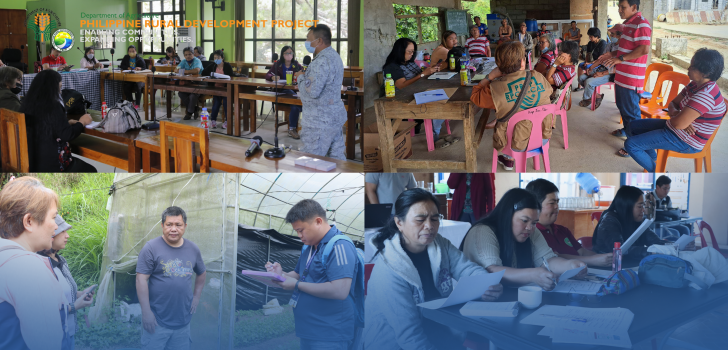
DA-PRDP CAR amplifies support to enterprise PGs through trainings, monitoring
Beyond the implementation of enterprise development subprojects under the Department of Agriculture-Philippine Rural Development Project (DA-PRDP), technology and skills trainings along with monitoring activities and enterprise assessments are being conducted to further support the Proponent Groups (PGs) in operating and sustaining their enterprises.
In CAR, the PGs of 49 out of 52 completed enterprise subprojects were already assessed wherein key areas that need technical assistance and support services are identified. The enterprise subprojects’ progress in terms of organization and administration, enterprise operation, financial management, marketing, sustainability and inclusivity are evaluated. As part of the assessment, Capacity Development Plans are prepared which can serve as reference in linking the PGs to agencies that offer the interventions and services that they need. Enterprise Assessments are regularly conducted every three years.
The RPCO-CAR enterprise development (I-REAP) component also visits the PGs to monitor their enterprise operations and conduct coaching activities on financial and organizational aspects.
According to RPCO-CAR Enterprise Development and Marketing Specialist Johnson Cea, on-site coaching/mentoring activities has its perks because it is focused on the PG’s unique situation as it offers a more personalized approach.
“On-site coaching and mentoring is more interactive and we learn more about the situation of the PG and their enterprise. As such, we’ll have a better outlook on how to better assist them. Plus, more PG members/officers are involved,” said Cea.
In terms of capability development, the RPCO-CAR facilitates the conduct of several skills and technology trainings based on their Training Needs Assessment and Capacity Development Plan. The trainings that are usually conducted are on production and management practices, Good Agricultural Practices, Digital Marketing, Disaster Response and Management, and Basic Bookkeeping among others. These trainings are usually conducted in partnership with the DA banner programs, other government/non-government agencies, and/or private individuals as resource person/s.
Prior to implementation, the PGs and local government unit representatives were also trained on business plan preparation among other topics relevant to the approval/implementation process of the PGs’ enterprise subprojects.
For this year, the I-REAP component has targeted to establish institutional linkages with state universities and other agencies to further aid the PGs in terms of capability/organizational development and marketing.
More trainings programs specifically on product development, leadership and management, Good Manufacturing Practices, Customer Relations Management, and benchmarking activities for coffee enterprise PGs are also set to be conducted within this year. ### (Elvy T. Estacio, RPCO-CAR)
